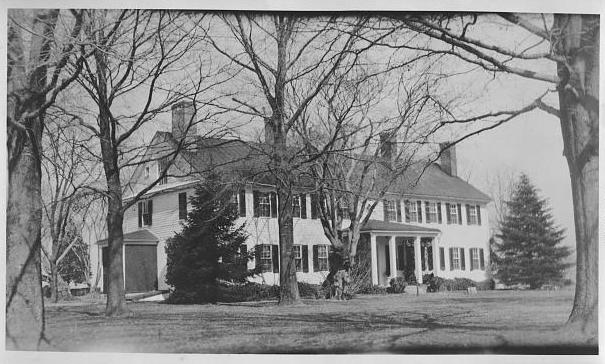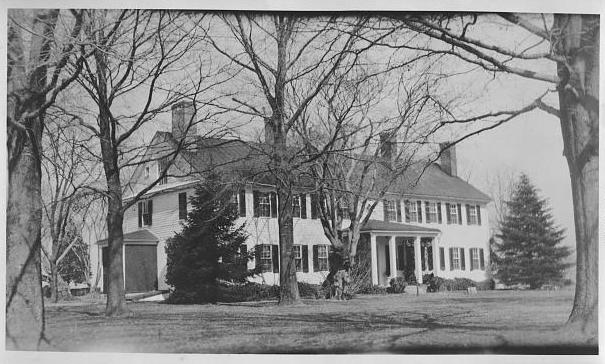
There is an unfortunate notion that the elite leaders of colonial Virginia were somehow deists or agnostics, and that they operated in a sort of less-religious universe than Puritans up north. And it is true, of course, that Mayflower folk were leaving Europe for religious freedom, and the Virginia settlers came more for a better life, and often led a life of excess.
But I came across a fascinating anecdote while re-reading David Hackett Fisher’s Albion’s Seed, the 1989 survey of American folkways that explain how settlers from different areas of Britain created patterns of living in the U.S. that are prevalent today. In the book, author Fisher cites Philip Bruce’s 1907 history Social Life in Virginia to describe some of the 391 books in Ralph Wormeley’s library at Virginia’s Rosegill plantation in Middlesex County. Of those books, 123 volumes were religious in nature, indicating that the elite figures of Virginia society were in some cases, striving deeply to be better men.
Which Ralph Wormeley it is is unclear; there were a half dozen or so Ralphs living between the mid 17th and 18th centuries in that handsome plantation atop that hill overlooking the Rappahannock River. And because the Rosegill library and house were passed on, the books would have probably informed generations, not just one pious man. Historian John Fiske in the 1898 Old Virginia and her neighbors writes that “Though not the library of a scholar, it indicates that its owner was a thoughtful man and fairly well informed.” Which is not too bad.
What is clear from reviewing these instructional titles is that they were specifically about personal spiritual journeys and self improvement. Unlike modern and deceptive notions of making others bend to your version of the faith, the better idea is to get your sin and miserable wretch of a life under control, so you can be Christ’s light. These books are more about a personal redemption, not social justice self-righteousness; they are about how you can improve yourself as a man, and live in a better way. Some of the books (thankfully all are online now) mentioned included:

Richard Allestree‘s The Gentleman’s Calling and The Whole Duty of Man. The latter was, according to Fisher, a devotional book “found more often in Virginia libraries than any other book.” Allentree, born around 1619, was a Royalist clergyman who was also provost of Eton. Allestree’s Whole Duty has very specific instructions for things in its over 500 pages, some quite helpful. For instance, on page 115 there was advice on watchfulness. “lastly be as watchful as is possible over thy heart in time of Prayer, to keep out all wandring thoughts, or, if any have gotten in, let them not find entertainment, but as soon as ever though discerns them, suffer them not to abide one moment, but cast them out with indignation, and beg God’s Pardon for them.” The Oxford Library version of the book is HERE.
The library also contained Bishop Jeremy Taylor‘s The Rule and Exercises of Holy Living and Holy Dying. Taylor, who is honored with a Lesser Feast day in the Church of England calendar, was a bishop and chaplain to Charles I. The book is HERE. A sample concerns how a man should seek out other great men, and study and emulate them.
Writes Taylor:
“It is then that the man who is not resolved to degrade himself, should solicit new strength in the communion of those who have fought the good fight and have gained the crown; that the patriot should study the shape and countenance of public virtue, as in a gallery of the illustrious dead, and feel the littleness of all fame that gravitates to faction; that, above all, the Christian, surrounding himself with their recollections, and shutting out, as with the curtains of the sanctuary, the heated passions and petulant caprices of the time, should imbibe new energies of immortality. It is by such uses that the renown of genius, patriotism, and sanctity becomes a splendid realization; that the suffering of the past revives as the lesson of present wisdom; that the living eye catches light from beyond the grave, and the forms catches light from beyond the grave, and the forms of the saint and martyr stand before us, like Moses and Elias in the mount, in their glory, telling at once of the brief suffering and the imperishable reward.”
Oh how Taylor’s phrase “Feel the littleness of all fame that gravitates to faction!” might inform some of us today who cannot talk to a person they disagree with for fear of blowing up like a red balloon at an arcade water clown balloon race.
John Bunyan’s wife inherited a copy of Lewis Bayly‘s 1613 book Practice of Piety, another book in the Rosegill library. The book, available HERE, was apparently one the few possessions of the Bunyan’s early possession-less life together. A 19th century reprint described The Practice of Piety as changing Bunyan completely, “This begot in him a desire to reform his vicious life, and he forthwith began.” Bailey was a Scottish born chaplain to James I who was later made bishop. Reading the book today is actually quite useful; consider this description of how to wake up:
Practice of Piety, another book in the Rosegill library. The book, available HERE, was apparently one the few possessions of the Bunyan’s early possession-less life together. A 19th century reprint described The Practice of Piety as changing Bunyan completely, “This begot in him a desire to reform his vicious life, and he forthwith began.” Bailey was a Scottish born chaplain to James I who was later made bishop. Reading the book today is actually quite useful; consider this description of how to wake up:
“As soon as ever thou awakest in the morning, keep the door of thy heart fast shut, that no earthly thought may enter, before that God come in first; and let him, before all others, have the first place there. So all evil thoughts either will not dare to come in, or shall the easier be kept out; and the heart will more savour of piety and godliness all the day after;”
Edward Synge’s 1693 book A Gentleman’s Religion has a much broader perspective, and not only speaks to men personally, but as a class. Synge, an Irish Archbishop of Tuam, wrote powerfully on how Christianity was about about making better men. I love this line:
It is no less evident to me, that the main Design of Jesus, and of his Disciples, whom he sent to preach the Gospel, was, to make Men not wiser, as to Matters of Speculation, but better, and more virtuous as to their Lives and Actions.
After you have perused some of these 17th century books, and make yourself a better man, take a learn from some of the videos of David Hackett Fisher on C-SPAN.
